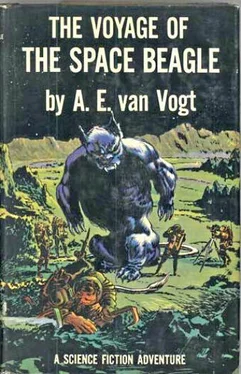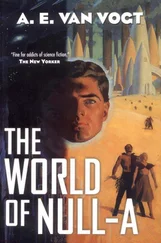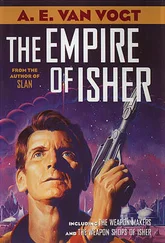The minutes went by. And still Coeurl restrained himself. Still he lay there watching, aware that the men knew he watched. They floated a metal machine from the ship to the rock mass that blocked the great door of the building. His fierce state noted all their movements. Even as he shivered with the intensity of his hunger, he saw how they operated the machinery, and how simple it was.
He knew what to expect finally when the flame ate incandescently at the hard rock. In spite of his preknowledge, he deliberately jumped and snarled as if in fear.
From a small patrol ship, Grosvenor observed the action. It was a role he had assigned himself, watching Coeurl. He had nothing else to do. No one seemed to feel the need of assistance from the one Nexialist aboard the Space Beagle.
As he watched, the door below Coeurl was cleared. Director Morton and another man came over together. They went inside, and disappeared from view. Presently their voices came through Grosvenor’s communicator. The man with Morton spoke first.
“It’s a shambles. There must have been a war. You can catch the drift of this machinery. It’s secondary stuff. What I’d like to know is, how was it controlled and applied?”
Morton said, “I don’t quite understand what you mean.”
“Simple,” said the other. “So far, I’ve seen nothing but tools. Almost every machine, whether it’s a tool or a weapon, is equipped with a transformer for receiving energy, altering its form, and applying it. Where are the power plants ? I hope their libraries will give us a clue. What could have happened to make a civilization crash like this?”
Another voice broke through the communicators. “This is Siedel. I heard your question, Mr Pennons. There are at least two reasons why a territory becomes uninhabited. One is lack of food. The other is war.”
Grosvenor was glad that Siedel had used the other’s name. It was another voice identified for his collection. Pennons was chief ship’s engineer.
Pennons said, “Look, my psychological friend, their science should have enabled them to solve their food problems, for a small population at least. And failing that, why didn’t they develop space travel and go elsewhere for their food?”
“Ask Gunlie Lester.” It was Director Morton. “I heard him expounding a theory before we landed.”
The astronomer answered the first call. “I’ve still got to verify all the facts. But one of them, you’ll agree, is significant by itself. This desolate world is the only planet revolving around that miserable sun. There’s nothing else. No moon. Not even a planetoid. And the nearest star system is nine hundred light-years away. So tremendous would have been the problem of the ruling race of this world that in one jump they would have had to solve not only interplanetary but interstellar-space flight. Consider for comparison how slow our own development was. First, we reached the moon. The planets followed. Each success led to the next, and after many years the first long journey was made to a near-by star. Last of all, man invented the anti-accelerator drive which permitted galactic travel. With all this in mind, I maintain it would be impossible for any race to create an interstellar drive without previous experience.”
Other comments were made, but Grosvenor did not listen. He had glanced towards where he had last seen the big cat. It was not in sight. He cursed under his breath for having let himself be distracted. Grosvenor swung his small craft over the whole area in a hasty search. But there was too much confusion, too much rubble, too many buildings. Everywhere he looked there were obstacles to his vision. He landed and questioned several hard-working technicians. Most recalled having seen the cat “about twenty minutes ago.” Dissatisfied, Grosvenor climbed back into his lifeboat and flew out over the city.
A short while before, Coeurl had moved swiftly, seeking concealment wherever he found it. From group to group he sped, a nervous dynamo of energy, jumpy and sick from his hunger. A little car rolled up, stopped in front of him, and a formidable camera whirred as it took a picture of him. Over on a mound of rock, a gigantic drilling machine was just going into operation. Coeurl’s mind became a blur of images of things he watched with half-attention His body ached to be off after the man who had gone alone into the city.
Suddenly he could stand it no longer. A green foam misted his mouth. For a moment, it seemed, no one was looking at him. He darted behind a rocky embankment and began to run in earnest. He floated along with great, gliding leaps. Everything but his purpose was forgotten, as if his brain had been wiped clean by some magic, memory-erasing brush. He followed deserted streets, taking short cuts through gaping holes in time-weakened walls and through long corridors of mouldering buildings. Then he slowed to a crouching lope as his ear tendrils caught the id vibrations.
Finally, he stopped and peered from a scatter of fallen rock. A two-legged being was standing at what must once have been a window, directing the beams of his flashlight into the gloomy interior. The flashlight clicked off. The man, a heavy-set, powerful individual, walked off swiftly, turning his head alertly this way and that. Coeurl didn’t like that alertness. It meant lightning reaction to danger. It presaged trouble.
Coeurl waited until the human being had disappeared around a corner, then he padded into the open, faster than a man could walk. His plan was clearly made. Like a wraith he slipped down a side street and past a long block of buildings. He turned the first corner at great speed, leaped across an open space, and then, with dragging belly, crept into the half-darkness between the building and a huge chunk of debris. The street ahead was a channel between two unbroken hills of loose rubble. It ended in a narrow bottleneck, which had its outlet just below Coeurl.
In the final moment he must have been too eager. As the human being started to pass by below, Coeurl was startled by a tiny shower of rocks that streamed down from where he crouched. The man looked up with a jerk of his head. His face changed, twisted, distorted. He snatched at his weapon.
Coeurl reached out and struck a single crushing blow at the shimmering, transparent headpiece of the space suit. There was a sound of tearing metal and a gushing of blood. The man doubled up as if part of him had been telescoped. For a moment his bones and legs and muscles combined almost miraculously to keep him standing. Then he crumpled with a metallic jangling of his space armour.
In a convulsive movement, Coeurl leaped down upon his victim. He was already generating a field that prevented the id from being released into the blood. Swiftly, he smashed the metal and the body within it. Bones cracked. Flesh spattered. He plunged his mouth into the warm body and let the lacework of tiny suction cups strain the id out of the cells. He had been at this ecstatic task about three minutes when a shadow flicked across his eye. He looked up with a start, and saw that a small ship was approaching from the direction of the lowering sun. For one instant, Coeurl froze, then he glided into the shelter of a great pile of debris.
When he looked again, the small vessel was floating lazily off to the left. But it was already circling, and he saw that it might come back toward him. Almost maddened by the interruption of his feeding, Coeurl nevertheless deserted his kill and headed back towards the space ship. He ran like an animal fleeing danger, and slowed only when he saw the first group of workers. Cautiously, he approached them. They were all busy, and so he was able to slip up near them.
In his search for Coeurl, Grosvenor grew progressively dissatisfied. The city was too large. There were more ruins, more places of concealment than he had first thought. He headed back finally to the big ship. And was considerably relieved when he found the beast comfortably sprawled on a rock sunning himself. Carefully, Grosvenor stopped his ship at a vantage height behind the animal. He was still there twenty minutes later when the chilling announcement came over the communicator that a group of men who were exploring the city had stumbled over the smashed body of Dr. Jarvey of the chemistry department.
Читать дальше











